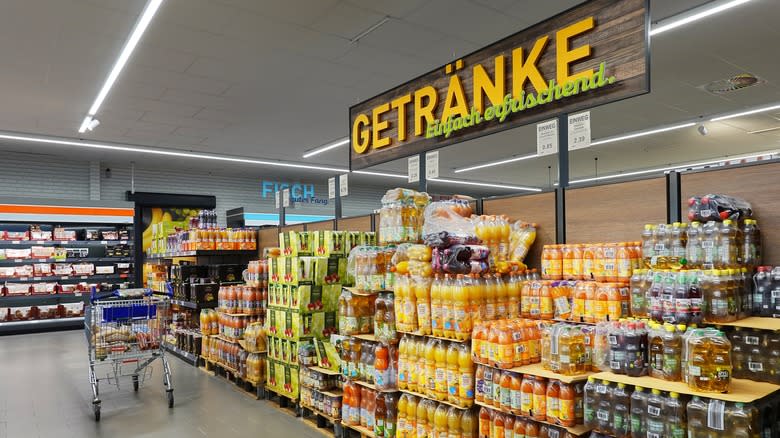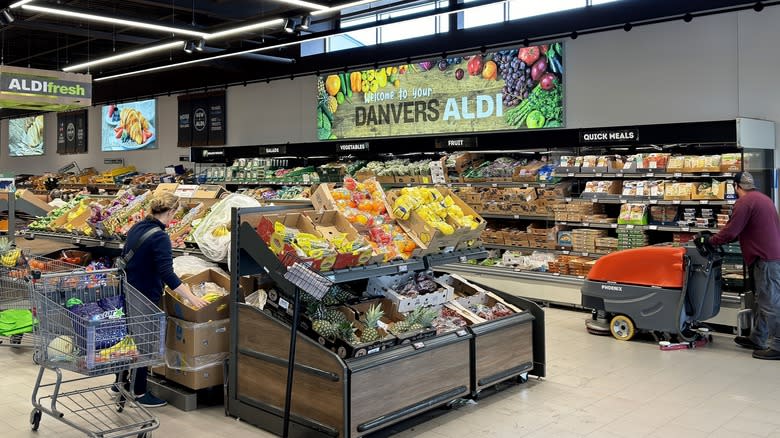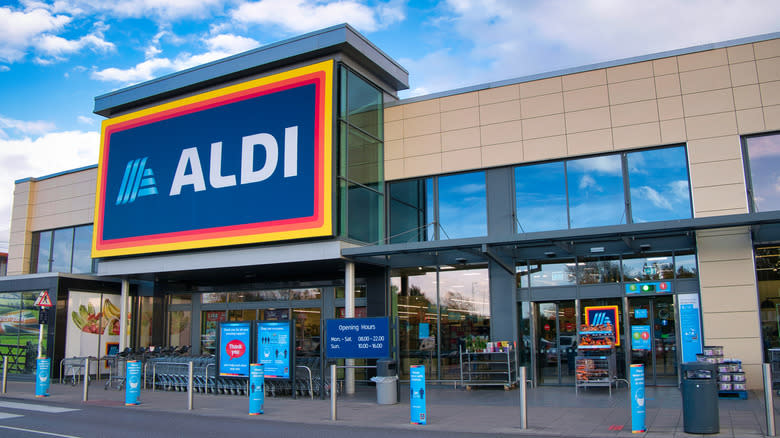The Types Of Food You're Not Going To Find At A German Aldi

Aldi is a chain that's been beloved by Americans since 1976 when the first store was opened in Iowa. However, as much as it's become a staple supermarket for those in the U.S. looking for a bargain, the chain is actually German. And, although the U.S. supermarket boasts a spread of German products that might have you believing the counterpart across the ocean is the same, that's not the case.
Daily Meal's team visited a German Aldi and discovered that, in fact, there were a few American staples missing from the European store's shelves. For one thing, you won't find the spread of Mexican products such as taco seasoning, Goya beans, and cornmeal. What's more, the German counterpart doesn't host as many pre-packaged foods. Although you may still stumble across the odd ready-to-eat salad or sushi, you won't find the rows of ready-made pasta, pizzas, and other goodies we're accustomed to in the United States. You also won't come across the wide array of pumpkin spice food and drinks that so many of us look forward to when autumn rolls around.
Of course, even though German Aldi may be lacking in a few areas that Americans are accustomed to, they do have some products you won't find stateside. They've got a wide range of Italian aperitivos (think Aperol) and French wines to pair with your meal. Or, if you're dying for a quick meal on the go, there are some good deli salads and tasty regional pastries.
Read more: 10 Frozen Foods You Should Always Buy At Aldi
Why Is The German Aldi So Different?

In terms of the fewer pre-packaged meals, one contributing factor to this may have to do with German food culture. Germans place a high level of importance on health and cooking at home, so they aren't as likely to purchase ready-to-eat options, even if they are available. As such, those items may just not be as profitable for the chain. As with many American foods that are banned abroad, Germany also has stricter food additive laws. That could make selling pre-packaged foods more logistically tricky.
As for Mexcian food, this may be chalked up to simple demographics. According to Mexico's government, as of 2020, only about 18,000 Mexicans were living in Germany among a population of 84.4 million. In contrast, in the U.S., Latinos make up about 19% of the population, with Mexicans being the largest represented group. This makes the demand for Mexican products much higher.
Now, it's important to note that your German Aldi may differ more or less from the U.S., depending on where you are. Aldi has two different branches that operate in different regions of the world. Although they are contractually linked, they're separately operated -- Aldi Nord and Aldi Süd. Germany, though, has stores run by both Aldi Nord and Süd.
What About Other Countries?

Aldi isn't just limited to the U.S. and Germany. In fact, you'll find this grocery chain in more than 10 countries. And, each country's Aldi is a little bit different. This may, in part, be thanks to who's actually operating the store. Some of those countries, such as the U.K., the U.S., and Australia, are run by Aldi Süd. Aldi Nord, on the other hand, is responsible for stores in Spain, Poland, and other Western European areas.
However, other differences might have more to do with regional preferences. For instance, in the U.K., Aldis have a fresh pastry section with treats like tarts and bread. At the same time, in Australia, you'll find local favorites in the snack aisle, such as mini melting moments. Just like in Germany, these other international stores are tailored to what foods are popular in the country. What's more, Aldi Süd and Aldi North have different policies and quality standards, which could result in differences depending on which one you go to. With all that in mind, the bottom line is clear -- if you ever find yourself at Aldi in Germany, don't expect to get the exact same spread as in the U.S.
Read the original article on The Daily Meal.


